To most of us, the word "Scouting" denotes a movement started in England by Lord Robert Baden-Powell and united as a world-wide youth organization. However, this perception is not necessarily correct. In fact, Scouting takes many forms and shapes, both physically and ideologically.
The Scout movement based on the ideals and principles of B-P is a voluntary, non-political educational organization. The national association of the Scout groups using the B-P methods are united through membership in The World Association of Girl Guides and Girl Scouts (WAGGGS) or The World Scout Movement (WOSM). Stamps and other philatelic related materials related to the Boy Scouts, Girl Scouts and Girl Guides are of prime interest to many collectors. Besides the above mentioned organizations, however, there are the other ones.
The "other ones," referred to are those youth organizations that differ from B-P's Scouts and Guides in various manners; and who are not members of WOSM or WAGGGS. The "others" can be divided into four categories:
- Scouts-in-Exile
- Independent Scouts
- Scout-like youth organizations
- Totalitarian youth groups
Many collectors of bonafide Boy Scout/Girl Guide philatelic material have sub-collections of one or more
of the groups listed. They make an interesting postal history addition to one's collection. Let
us consider each of the groups and the philatelic material associated
with each in a little more detail.
Scouts-in-Exile
Scouts-in-Exile groups formed overseas from their native country as a result of war and changes in
governments. Philatelically, much material was issued by
Scouts-in-Exile, and is still issued by some of
these groups. This includes Displaces Persons Camps (DP Camps)
postal delivery. These Scouts-in-Exile stamps and seals are avidly collected.
Independent Scouts
With the publication of B-P's Scouting for Boys, Scouting spread through the world.
It also produced, and is still producing, independent Scout organizations, each differing from B-P's
original concept - changed by the desires of their founders. Thus, some put
greater emphasis on: nationalism, religion, militarism, or some other personal "ideals." All start
as alternatives, and in competition to B-P's Scout movement.
The British Boy Scouts founder was Major W G Whitby, the Chief Commissioner. "The Association is first and foremost a Christian organisation and seeks to serve the Christian Church as a means of advancement of the Christian Faith." The girls section is known as the British Girl Scouts. Sir Francis Vane joined the BBS in 1910, and by 1911 had been given the title "Grand Scoutmaster." At it's peak, the BBS had spread to Canada, Australia, New Zealand, Hong Kong, Egypt, South America and India. Financial difficulties and disagreements over leadership caused some troops to join the Boy Scouts Association. By 1930, the BBS was reduced to only a few troops in the UK and Australia. After dropping down to only one troop by 1970, the BBS has gradually expanded in size.
The British Boy Scouts joined with Boys Life Brigade in February 1910 to form the National Peace Scouts. The Ragazzi Esploratori Italiani the Boys Guide Brigade of South Africa and the American Boy Scouts linked with the NPS in 1911 to form the first international organization called the Legion of World Scouts. The LWS and the NPS dissolved over the course of World War I as each group was absorbed into the predominant national Scout movement with the exception of the BBS.
Sir Vane used BBS to form the basis of the international Order of World Scouts in November 1911. In the 1990s a revival of the Order of World Scouts began with the revival of the BBS. The Scouts of Australia joined with the BBS in 1991, followed by the Canadian Independent Scout Association in 1999 and Poland in 2002. Independent members in Ireland and Hawaii also exist.
There are several other groups that compete directly with national Scouting programs. The Na Fianna Eireann [The Irish National Scouts], whose publication states "...is an alternative scouting program for boys and girls interested ... more democratic world." Also in Ireland is the Federal Scouts of Ireland. The Voortrekkers were described in South Africa as the Afrikaner's version of the Scout movement. Eclaireurs Neutres de France were organized after the World Jamboree held during 1947 in France. The Federation International of European Scouting has units in Italy, France and England. The World Federation of Independent Scouts formed in Germany in 1995 and has grown to include members on just about every continent. Other groups include the British Scout Federation and the British Pathfinder Scouts Association.
In the United States, as well as in many other countries, the use of the words "Scout" and "Scouting"
are protected by law. Hence some of the groups listed above may using the name without
authorization. None, of course, are affiliated with either WOSM or WAGGGS. Postally related
material issued by the above groups is available, but scarce. As they are generally "unofficial"
at the national level, only the Voortrekkers have been honored by their country with a postage stamp.
Scout-like Youth Organizations
In the early part of the 20th century there were only a few organizations that were
appealing to the boys and girls of the day. Currently there are many youth organizations
available to boys and girls, and each doing good in its own way. Many of the current
youth organizations draw upon B-P's and other early Scout leader's material. These
groups include the Woodcraft Folk, the Order of Woodcraft Chivalry,
Kibbo Kift, Life Pioneers, and the Outlanders. The Nazarene Caravan
and the Assembly of God's Royal Rangers operate in the United States.
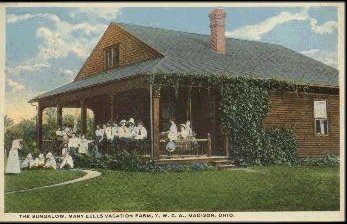
The oldest youth organization is the Young Women's Christian Association (YWCA), founded in 1857.
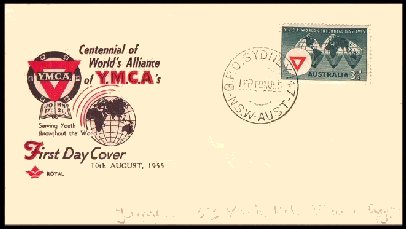
The largest youth organization outside of Scouting in the free world is the Young Men's Christian Association (YMCA), founded in 1882. The YMCA and YWCA do sponsor Scout troops in countries around the world.
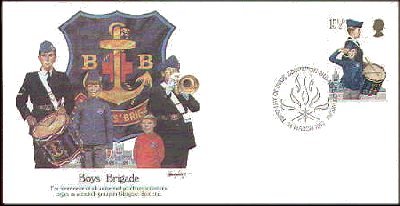
The Boy's Brigade was started in Scotland by William Alexander Smith in 1883. It is now world-wide but primarily found in British Commonwealth countries.
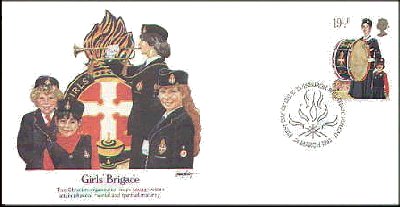
The Girl's Brigade is a companion organization to the Boy's Brigade found in the same countries.
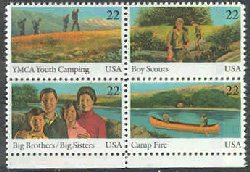

The Camp Fire Girls were started in New York City in 1910. Recently they dropped the word "Girl" from their name and became co-educational. Other Scout-like groups include the Big Brother/Big Sisters of America, St. John Cadets, Red Cross Youth Organization, Boys/Girls Clubs of America, clubs sponsored by the Rotary, Lions, and Kiwanis service clubs, and various church-sponsored clubs.
The two largest rural youth service organizations in the United States are the 4-H Club, founded in 1912, and the Future Farmers of America, founded in 1917. Although they are volunteer organizations, they are both associated with, and partially sponsored by the U.S. Department of Agriculture and local governments. Both have been honored with postage stamps in the U.S.
Since most of the Scout-like organizations are only similar in a minor way, most collectors of Scout
postal material find these items only of minor interest.
Totalitarian Groups
Scouting is banned by all totalitarian governments because they dislike the ideals of B-P. However,
these same governments recognize the power of Scouting and have thus incorporated B-P's methods, at
least some of them, in their own youth organizations.
Prior to World War II, Germany, Italy and the Japan disbanded Scouting. In Nazi Germany there was the Hitler Jugend [Hitler Youth]. Mussolini had a fascist group, the Balilia. In parts of Europe existed the socialist Red Falcons. The governments issued postage stamps, postcards and commemorative cancels for these groups as part of the propaganda campaign.
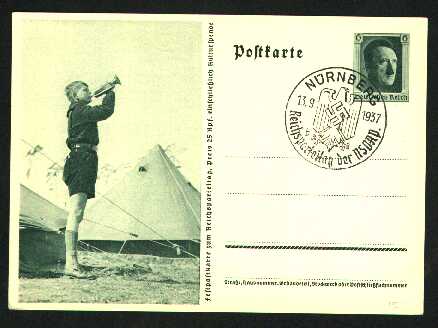
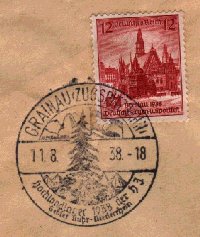
In parts of Europe existed the socialist Red Falcons. In the Soviet Union (1923) and during the Cold War period (1945-1991) Scouting was suppressed in communist countries and the Young Pioneers established.
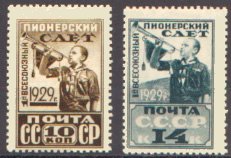
After the collapse of the Berlin Wall and the Warsaw Pact, Scouting has begun again in every country in Eastern Europe, to include Russia, often with the aid of their original Scouts-in-Exile organization. Some have even issued new Scout stamps, postcards and cancels. Today, the Young Pioneers continue only in China, Cuba, North Korea and Vietnam.
SOSSI Journal, Volume 37, Number 9, September 1982
Updates and Modifications by Keith Larson
- World Federation of Independent Scouts
- International Union of Guides and Scouts of Europe
- Eclaireurs Neutres de France
- Scout History Association
- Camp Fire
- Young Men's Christian Association
- Young Women's Christian Association
- Boys' Brigade UK
- Die Voortrekkers
- Future Farmers of America
- The 4-H
- Young Pioneers People's Republic of China
- Scouting in the Pioneer Movement


